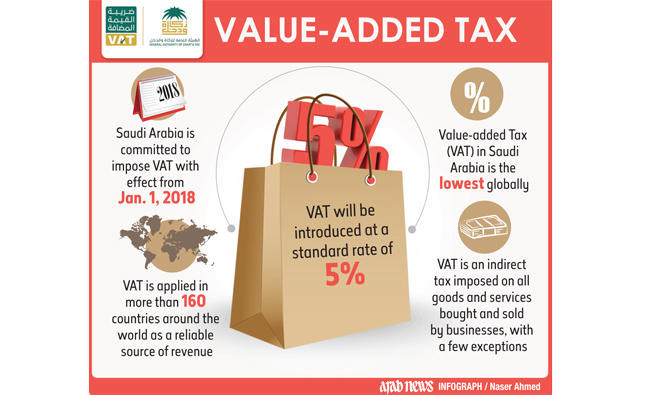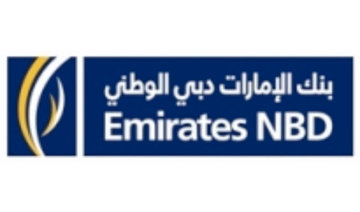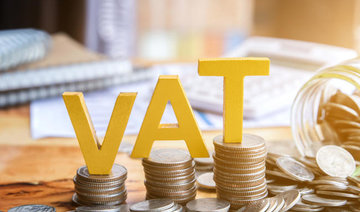JEDDAH: The 5 percent value-added tax (plan) will not be imposed on certain medicines and medical equipment, according to Reuters citing a statement carried by Saudi Press Agency (SPA) on Saturday.
All other private health care services will be taxed at the standard rate, the statement said, citing directives issued by the General Authority of Zakat and Tax (GAZT), the Ministry of Health and the General Authority for Food and Drug Affairs.
Last week, the tax authority had confirmed that interest or lending fees charged with an implicit margin for finance will be exempt from value-added tax (VAT).
GAZT officials, at a workshop held in Jeddah for members of the local media, also quashed rumors about ATM withdrawals and clarified that customers would not be charged for withdrawing or transferring money from their accounts using ATMs.
However, the 5-percent tax will be imposed on banks’ administrative charges such as the issuance of checkbooks, statements of accounts and safety deposit boxes and the customer will have to bear this expense.
In a bid to facilitate businesses, the authority also announced that the first year after VAT launch will be a transitional period. Goods and services supplied under certain long-term contracts will be zero-rated during that period provided the existing contracts meet certain requirements. This will enable suppliers and customers, who had entered into long-term contractual commitments, to re-negotiate the contracts’ details, particularly details that will be affected by VAT implementation.
GAZT clarified that this treatment only applied to contracts that did not anticipate VAT. Contracts that contain tax-related provisions or mechanisms to adjust prices of goods and services and include VAT will not be included.
Saudi Arabia and the UAE are expected to be the first Arabian Gulf countries to introduce the GCC-wide VAT on Jan. 1, 2018, while other member states have committed to implementing their own VAT taxation by next year.
Gulf states have been looking at other ways to reduce dependency on oil revenues, as well as create new income streams to fund government services including public health services, public owned or funded schools, parks and transport infrastructure.
It is estimated that the VAT’s imposition will raise between $7 billion and $21 billion annually — or between 0.5 percent and 1.5 percent of regional GDP. The International Monetary Fund (IMF) has said the returns could reach around 2 percent of region’s output.
The GAZT has urged businesses with annual revenues of more than SR1 million ($266,640) to expedite their VAT registration process and ensure their readiness for its implementation.
Certain medicines, medical equipment exempted from VAT in Saudi Arabia
Certain medicines, medical equipment exempted from VAT in Saudi Arabia

Saudi FM receives his Iranian counterpart in Jeddah

- Araqchi traveled to Jeddah to meet with senior Saudi officials
- The visit comes ahead of possible indirect US-Iran talks in Oman on Sunday
RIYADH: Saudi Foreign Minister Prince Faisal bin Farhan on Saturday received his Iranian counterpart Abbas Araghchi in Jeddah, Al Arabiya News Channel reported.
Araghchi traveled to Jeddah to meet with senior Saudi officials and discuss bilateral issues and regional and international developments.
He is expected to later travel to Qatar to participate in the Iran-Arab World Dialogue summit in Doha, an Iranian ministry spokesperson said on Friday.
The visit also comes ahead of scheduled indirect US-Iran talks in Oman on Sunday and an expected trip to the region by US President Donald Trump.
Little Explorer event in Jeddah connects young minds with archeology, heritage

- Initiative offered interactive, engaging educational experience
Jeddah: The Little Explorer event, which was organized by the Heritage Commission in Jeddah and ran from May 6-10, offered an interactive and engaging educational experience for children.
The event aimed to raise awareness about the importance of archeological excavation and strengthen the connection between younger generations and the Kingdom’s cultural heritage, the Saudi Press Agency reported.
Blending entertainment with education, the event sought to foster a generation that values antiquities and their role in strengthening national identity.
Held in Bab Jadeed, the event was part of the commission’s efforts to engage young people in heritage preservation through educational and hands-on activities, which introduced archeological principles and promoted the protection of historic sites.
The event featured five main pavilions, each designed as an educational and interactive station, according to the SPA.
The Little Explorer’s Tale took place in an interactive cinema screening an educational animation that simulated an exploratory journey to the Al-Faw archeological site, offering an engaging introduction to cultural heritage.
Children at the Explorer’s Academy viewed authentic artifacts from various civilizations and learned about excavation tools and archeological processes.
The Excavation Simulation offered a hands-on experience, allowing participants to search for artifacts using real tools in a realistic sand-filled setting.
The Archeological Workshop provided a space for creative drawing with children learning about historic monuments with the help of iPads.
The Play and Learn area combined recreational games with archeological themes, making heritage exploration both fun and educational for children.
Olympiad delegates explore Saudi heritage, hospitality

Dhahran: International delegations taking part in the Asian Physics Olympiad, hosted by Saudi Arabia in Dhahran from May 4 to 12, enjoyed a dynamic schedule of scientific competitions, cultural activities, educational events and entertainment.
The enriching experience brought together 240 students from 30 countries and 110 international physics specialists, the Saudi Press Agency reported.
Beyond the competitions, the program included educational and cultural visits highlighting Saudi Arabia’s rich heritage and scientific progress, while promoting global youth engagement and cultural exchange.
Wearing traditional Saudi attire as a sign of respect, participants experienced the Kingdom’s hospitality, sampled Saudi cuisine and took part in interactive events that fostered cultural connection.
This year’s Olympiad holds special significance as it marks the 25th anniversary of the competition. For more than two decades, it has united talented youth from across the globe, encouraging scientific excellence and cross-cultural understanding.
The final results — organized by the Ministry of Education, the King Abdulaziz and His Companions Foundation for Giftedness and Creativity, and King Fahd University of Petroleum and Minerals — will be announced during the closing ceremony on May 11 at King Fahd University in Dhahran.
Kingdom arrests 15,928 illegals in one week

RIYADH: Saudi authorities arrested 15,928 people in one week for breaching residency, work and border security regulations, the Saudi Press Agency reported on Saturday.
A total of 10,179 people were arrested for violations of residency laws, while 3,912 were held over illegal border crossing attempts, and a further 1,837 for labor-related issues.
The report showed that among the 1,248 people arrested for trying to enter the Kingdom illegally, 63 percent were Ethiopian, 35 percent Yemeni, and 2 percent were of other nationalities.
A further 45 people were caught trying to cross into neighboring countries, and 26 were held for involvement in transporting and harboring violators, the SPA reported.
The Ministry of Interior said that anyone found to be facilitating illegal entry to the Kingdom, including providing transportation and shelter, could face imprisonment for a maximum of 15 years, a fine of up to SR1 million ($260,000), as well as confiscation of vehicles and property.
Suspected violations can be reported on the toll-free number 911 in the Makkah and Riyadh regions, and 999 or 996 in other regions of the Kingdom.
New Hajj plan backs moderate, guided pilgrimage

MAKKAH: The Presidency of Religious Affairs at the Grand Mosque and the Prophet’s Mosque has launched the “Enriching the Field Path” initiative as part of the Kingdom’s operational plan for this year’s Hajj season.
The initiative aims to enhance the pilgrimage experience through scientific guidance and awareness programs that promote a message of moderate Hajj in multiple languages, the Saudi Press Agency reported on Saturday.
It includes more than 20 digital, technical, educational, devotional and faith-based awareness initiatives delivered in various languages.
Its goal is to enrich pilgrims’ spiritual journey with impactful religious content and high-quality services, enabling them to perform rituals with understanding in a devotional atmosphere.
Sheikh Abdulrahman Al-Sudais, head of the presidency, emphasized the importance of strengthening on-the-ground efforts to deliver improved enrichment services for all pilgrims.
He urged a focus on promoting the message of a moderate, faith-based Hajj to the global community through multilingual platforms.
Al-Sudais also called for easing ritual performance with gentleness, wisdom and compassionate guidance, while using digital tools and AI to overcome time and geographic barriers in spreading the message of a humane and moderate Hajj.




















